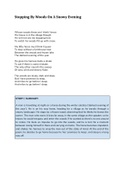Summary
Summary Poem Analysis of 'Stopping by Woods on a Snowy Evening' by Robert Frost
Here’s a detailed analysis of Robert Frost’s poem ‘Stopping By Woods On A Snowy Evening’; it’s tailored towards students taking the CIE / Cambridge A-Level syllabus but will be useful for anyone who’s working on understanding the poem at any level. Great for revision, missed lessons,...
[Show more]




